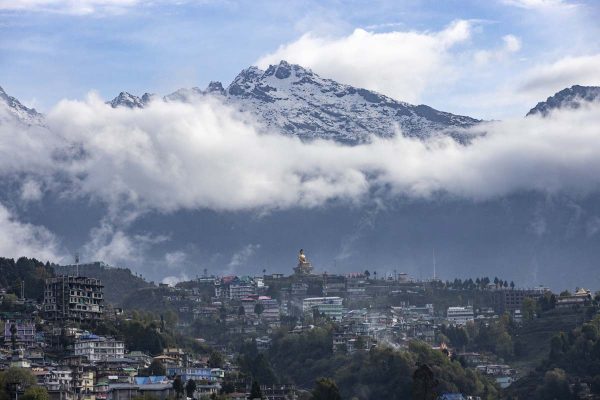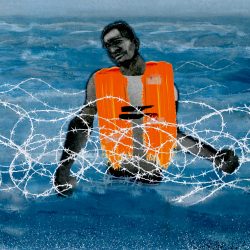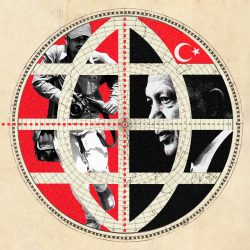
Contributor/Getty Images
How the Kremlin plans to prop up Putin
On June 23, traitors marched on Moscow. These false patriots had claimed to love their country but had secretly plotted against Russia. Brave Russian warriors acted swiftly to prevent the nation from descending into chaos. When the rebels saw the nation rally behind the president, they gave up their futile quest and agreed to resolve the matter peacefully.
This is what the Kremlin wants Russians to think happened when the battle-hardened mercenaries of the Wagner Group swept through Russia, unopposed, for over 600 miles before its leader, Yevgeny Prigozhin called off the march to Moscow.
As Wagner’s supposed coup attempt unfolded, Prigozhin became the undisputed star of the global news cycle. A former Kremlin caterer, Prigozhin, once an elusive figure, gained world renown following Russia’s invasion of Ukraine. As Wagner soldiers took on an increasingly prominent role on the frontlines, Prigozhin’s acerbic, angry rants about the incompetence of generals and legislators arguably represented the only sustained evidence that Russians were unhappy with how the war was going. Given Prigozhin’s adept use of Telegram, it made sense that he would seize the initiative through his now infamous Telegram voice notes, effectively offering listeners a blow-by-blow account of his troops’ journey to Moscow.
But now that the uprising has seemingly fizzled out — with Prigozhin apparently having negotiated safe passage to Belarus — the Kremlin is scrambling to gain control of the narrative. According to Maria Borzunova, an independent Russian journalist who hosts a show debunking Russian state propaganda, Kremlin pundits on state TV have, so far, parroted four key narratives to explain the coup.
First, the propagandists argued that the Russian military strike on the Wagner camp — which Prigozhin says precipitated his ill-fated march on Moscow — was staged. They also suggested that no one in Rostov-on-Don, the city Wagner briefly occupied, supported the mercenaries. This claim relies on a few shaky videos of Rostov residents confronting Wagner fighters. It also completely ignores widely circulated evidence of crowds in Rostov cheering Prigozhin’s private army.
During the rebellion, and in the days since, state propaganda channels have also continued to remind viewers that Prigozhin’s actions played into the hands of Russia’s enemies, in particular Ukraine. But it is in the way pro-government talking heads describe the bewildering resolution to the standoff that is most instructive.
According to the Kremlin’s version of events, the Russian people rallied behind Putin, displaying unity and resolve and undermining the enemy’s — likely foreign-funded — plot to bring Russia to her knees. “Their argument is that the civil war did not succeed because everyone rallied around the president,” said Borzunova. “However, this is not entirely true.” In fact, during the Wagner advance, a number of government officials recorded identical videos with the same text: “We support the president in this difficult situation.” Instructions for what they should write on social media were circulated to officials, Borzunova explained, and even then, some failed to publish the template text.
On June 27, Russian President Vladimir Putin gave an unannounced speech, his third in four days. Having already addressed the nation, he separately addressed the soldiers, who, he said, “have protected the constitutional order, the lives, security and freedom of our citizens, kept our homeland from descending into turmoil and stopped a civil war.” He handed out some medals and held a moment of silence for the pilots who were killed by Wagner mercenaries.
No state channels carried this particular speech live, but Russian state media received a written set of guidelines for reporting on it. Independent media outlet Meduza managed to obtain these instructions.
The document prompts reporters to refer to Wagner mercenaries as “rebels,” “traitors” and “false patriots,” whose actions could have plunged the country into chaos. It dubs the security forces “the real defenders of Russia” who worked to bring about a peaceful resolution. Putin, the guidelines remind journalists, is considered to be a “real leader” who prevented a “negative scenario of turmoil.” The explanation for Wagner’s sudden retreat is simple: The traitors realized that the Russian army “was not with them” and agreed to solve the conflict “without shedding blood.”
The word “Prigozhin” is notably absent from the guidelines. Putin, too, has meticulously avoided mentioning Prigozhin in all his recent speeches — a tactic reminiscent of his well-documented refusal to utter the name of jailed opposition politician Alexei Navalny.
Russian state propagandists have largely mimicked this rhetoric. “When virtually no one in society and in the government supported the rebellion, it became clear that the march on Moscow was meaningless,” said state TV presenter Dmitriy Kiselyov two days after the uprising. “Russia has once again passed the test of maturity, and the stronghold of unity has remained unshaken.” Russia’s commissioner for human rights, Tatyana Moskalkova, dubbed the uprising a lesson that “has once again demonstrated that Russia is undefeatable when it is united.”
As for Prigozhin, he has been branded a traitor, a label he is unlikely to ever shake. This was a complicated narrative shift for many Kremlin pundits to execute, Borzunova told me. Prigozhin had been loyal to Putin, and many in the government and state media shared the grievances he levied at the defense ministry before the uprising.
Still, the propagandists, though shaken, have quickly fallen in line. The rebellion has been quashed, the brave Russian soldiers commended and the coup leader mercifully exiled. Of course, the picture of unity that the Kremlin propaganda is working hard to paint is a fantasy. “The fabric of the state is disintegrating,” wrote Andrei Koleniskov, a senior fellow at the Carnegie Russia Eurasia Center. Prigozhin’s actions were “an antecedent of civil unrest unfolding in real time.”
And while speculation about the longevity of Putin’s regime continues around the world, the Kremlin propaganda machine keeps spinning its wheels, trying to narrate its way out of a crisis. The media guidelines that accompanied Putin’s recent speech emphasized the narrative that “the huge media machine of the rebels” attempted to destabilize the situation in the country. Evidently, it will take an equally powerful blitz of state propaganda to put Russia back on track.
“Propaganda is doing everything to say that Wagner fighters are patriots, they were used,” said Borzunova. “Prigozhin is the main villain. Whether this works or not, we’ll see.”
The campaign to villainize Prigozhin is far from over. On June 28, Putin acknowledged, for the first time ever, that the Wagner Group had been financed out of Russia’s state budget for the past year, to the tune of $2 billion. “I do hope that, as part of this work, no one stole anything,” Putin said, in a clear signal that Prigozhin — still reeling from last week’s “armed mutiny” criminal charges, which were dropped — might be charged with financial crimes next. In fact, independent Russian journalist Dmitry Kolezev reported on June 29 that the Kremlin has now decided to focus its information campaign on the “commercial” character of Prigozhin’s rebellion. “Allegedly, there was no political dimension to the rebellion at all,” Kolezev wrote. “It was all for money.”
If the Kremlin succeeds at convincing Russians that Prigozhin’s actions were a money-grabbing ploy, then the rebellion that, only days ago, seemed existential for the regime might actually strengthen Putin’s hand.
When every viable alternative to Putin — from the pro-Western, liberally-minded Navalny, formally jailed for fraud, to the Kremlin loyalist who took Bakhmut — is only after the nation’s coffers, there really is no alternative. Or so the Kremlin would have Russians believe.
CORRECTION [06/30/2023 11:19 AM EDT]: The original version of this story said that Maria Borzunova hosts “Fake News.” Borzunova is the former host of “Fake News” and currently hosts her own show debunking Russian propaganda.
The story you just read is a small piece of a complex and an ever-changing storyline that Coda covers relentlessly and with singular focus. But we can’t do it without your help. Show your support for journalism that stays on the story by becoming a member today. Coda Story is a 501(c)3 U.S. non-profit. Your contribution to Coda Story is tax deductible.
















